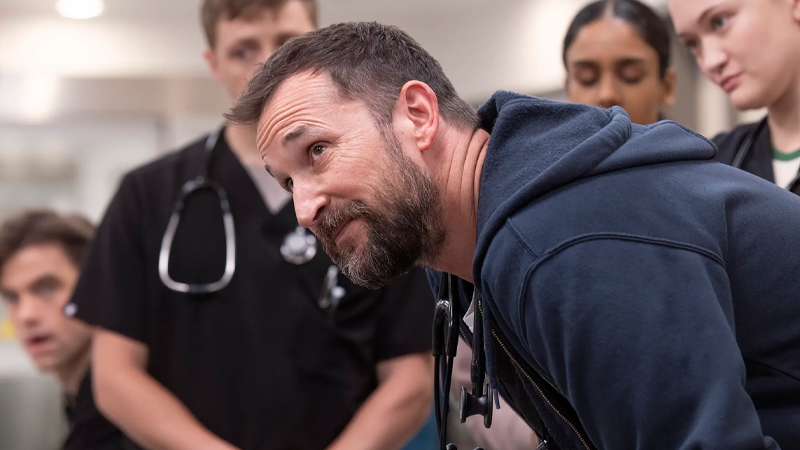Article Read Time

If you haven’t been watching Dr. Robby on The Pitt, first of all — what’s wrong with you? Second, let’s catch you up: It’s a brilliant, brutal drama set at a fictional urban teaching hospital. Think ER meets Succession, but with more scalpels and fewer apologies.
At the center of this controlled chaos is Dr. Robby: a battle-hardened trauma surgeon with the bedside manner of a buzzsaw and the leadership instincts of a battlefield general. He’s gruff, unsentimental, and somehow still magnetic. His surgical team fears him. Admires him. Occasionally wants to throttle him. In short, he’s exactly the kind of character who makes HR departments nervous — and the type of leader managers can learn from.
So if you’re running a campaign, managing a nonprofit, or trying to keep your scrappy startup from flatlining, here are five no-BS leadership lessons from The Pitt’s own Dr. Robby.
Dr. Robby Cuts Through the Noise
Dr. Robby doesn’t waste time on niceties. When the ER is chaos and lives are on the line, he’s not interested in your feelings — he wants results.
As a manager, you’re not saving lives (we hope), but you are trying to hit goals in high-pressure situations with limited resources and too many opinions in the room. Channel your inner Robby: be direct, be decisive, and don’t apologize for setting the standard. When someone’s work is sloppy, say so. When a deadline is missed, don’t sugarcoat it. The clarity you bring might feel uncomfortable initially, but it builds a culture of accountability.
Soft-pedaling underperformance does not build trust. It creates resentment from the people doing great work while others coast.
Train Like It’s War, So You Can Work Like It’s Peace
There’s a scene in episode three where Robby chews out a med student for freezing up during a code blue. His words? “You don’t rise to the occasion. You fall to your training. And right now, yours is crap.”
Ruthless? Maybe. True? Absolutely.
Good managers don’t just assign tasks and hope for the best. They train their team. They role-play tough conversations. They simulate high-pressure moments before they happen. If you want your field team to handle canvasser dropouts without panicking, or your social media manager to keep cool during a digital pile-on, practice for it. Stress-test your systems. Drill your team.
Do it when the stakes are low, so they don’t collapse when the stakes are high.
You’re Not Their Friend. You’re Their Leader.
Dr. Robby isn’t winning any “Coolest Boss” awards. He doesn’t throw pizza parties. He doesn’t remember birthdays. He doesn’t care what you think of him.
And that’s the point.
Too many managers, especially in mission-driven work, confuse leadership with friendship. They worry about being liked, and in doing so, fail to lead. Robby gets results because he isn’t chasing approval. He’s chasing excellence. And weirdly, that does earn respect. Real respect.
Your team doesn’t need another buddy. They need someone who has their back and holds their feet to the fire. Be that person.
Burnout Isn’t a Badge of Honor
Now let’s be clear — Dr. Robby is not a paragon of work-life balance. He’s up all night. He drinks too much coffee. He’s got a filing cabinet full of emotional repression.
But even Robby, in rare flashes of humanity, reminds his team (and us) that burnout is a liability. In episode six, he pulls a junior doc off rotation after she collapses from exhaustion, snapping: “Dead doctors don’t save lives.”
As a manager, if you’re modeling 80-hour weeks and checking emails at midnight, guess what your team will think they must do? Same thing. That’s not leadership. That’s toxicity in a trench coat.
Set boundaries, take time off, and encourage your team to do the same. You can be tough and sustainable. That’s what longevity looks like.
Honor the Work — Not the Ego
At the end of the day, Dr. Robby’s most consistent lesson is this: It’s not about you. It’s about the work.
He doesn’t grandstand. He doesn’t take credit. He gives the win to the intern who earned it and the loss to the attending who blew it. He praises in public, critiques in private, and never makes it personal — even when it is.
As a manager, if your leadership style centers you—your stress, your timeline, your glory—you’re doing it wrong. Shift the focus. Build a team culture where the mission matters more than who gets the credit, where performance speaks louder than politics, and where everyone knows their role, respects the work, and shows up ready to deliver.
Bottom Line? Be the Dr. Robby They Need — Not the Boss They Want
The Pitt dramatizes leadership under fire, but the core truths are evergreen. Leading well—especially in high-stakes, high-stress environments—means being clear, consistent, and courageous. It means making tough calls, having hard conversations, and giving people what they need, not just what they want.
So next time you face a deadline, a staffing crunch, or a full-blown campaign dumpster fire — ask yourself: What would Dr. Robby do?
Then do it. But maybe… with slightly fewer F-bombs.
Looking to take your organization to the next level? Contact TCHQ Communications today at 502-209-7619.



You must be logged in to post a comment.